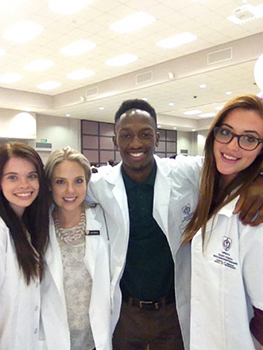Latest News Archive
Please select Category, Year, and then Month to display items
12 January 2024
|
Story Nonsindiswe Qwabe
|
Photo Sonia Small
 Since joining the UFS in 2008, Dr Grey Magaiza has worked extensively on approaches that can foster the socio-economic transformation of societies.
Since joining the UFS in 2008, Dr Grey Magaiza has worked extensively on approaches that can foster the socio-economic transformation of societies.
“The future should be one where communities can decide on their development agenda and futures. That’s the most important for me.” Dr Grey Magaiza, Deputy Director of the Centre for Gender and Africa Studies (CGAS) and Head of the Community Development programme on the Qwaqwa Campus, is passionate about capacitating communities to be agents of change and advancement. His vision for the future emphasises the empowerment of communities to take charge of their development by actively participating in decision making and the implementation of development projects that can improve their lives.
Since joining the UFS in 2008, Dr Magaiza has worked extensively on approaches that can foster the socio-economic transformation of societies. Over the years, he has crafted his research speciality into one that he is most proud of – being an interdisciplinary scientist immersed in the development of communities.
“I’m in a fortunate position of researching what I like. I say ‘fortunate’, because I’ve taken the time to understand what I’m passionate about, which is the overall field of rural livelihoods and livelihood futures – in short, community development. My research starts from an engaged university, understanding the elements that a university must use to enhance transformation and relevance to its immediate community in terms of development.”
One of the ways he has done this is by looking at social entrepreneurship as a development approach for young people in a rural setting. Through workshops with non-profit and civic organisations in Qwaqwa, Dr Magaiza has been helping these organisations to map out their needs and actively meet them through the involvement and support of external role players.
“We understand that communities are part of the national development agenda, but even that national agenda respects community knowledge and intentions and allows communities to shape their identity. A critical enabler of this is community organising. You bring back the capacity in communities to have dialogues on issues affecting them as spaces for engagement, knowledge exchange, and for people to just talk about their way forward.”
By enabling communities to define their development agenda, they can address their specific needs, challenges, and aspirations, he said. “When I look at livelihood futures, it’s quite an exciting aspect of my work – it’s like looking into a fortune tellers’ globe, because you’re not deciding for communities what they should do, but the communities themselves take those decisions.”
School of Medicine White Coat ceremony embraces first-years into the fold
2016-03-17

From the left are first-year UFS medical students Liandri Van Zyl, Lane Halberg, Wisani Baloyi, and Neve Steenbeek at the annual White Coat ceremony, wearing their white coats for the first time. |
“Life isn’t about yourself. It’s about what you can pour into the lives of others.” The first-year medical students will not soon forget Dr Lynette van der Merwe’s words during their recent White Coat ceremony. Dr Van der Merwe is the Programme Director of the MBChB undergraduate program at the University of the Free State (UFS) School of Medicine.
The annual White Coat ceremony is a tradition at the school to welcome first-year students to the world of medicine. As an official initiation into this new world, students are allowed to put on their white coats for the first time. During the ceremony, representatives from the Medical Students Association contributed to the significance of the event by reading a declaration of intent regarding professional behaviour for all medical students.
Dr Wayne Marais, Head of the UFS Department of Ophthalmology, was the guest speaker, sharing his vivid memories of being the first black student to study Medicine at the UFS in 1987. Prof Marais encouraged students to embrace their failures and successes, and to ultimately stay true to themselves – both personally and professionally.
Second-year medical students were at hand to offer advice and support. In addition to offering encouragement, they also assured the newcomers that there is a life outside of their books as well.
The entire ceremony not only served to welcome the first-years into the fold, but also unite them in a common purpose towards helping others in future.